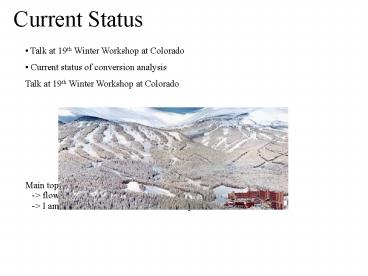Current Status PowerPoint PPT Presentation
1 / 12
Title: Current Status
1
Current Status
- Talk at 19th Winter Workshop at Colorado
- Current status of conversion analysis
- Talk at 19th Winter Workshop at Colorado
- Main topics of the workshop is an event
characterization - -gt flow and HBT.
2
Winter workshop (cont.)
- First, I would like to change my topics of doctor
thesis. - Direct photons ? Single electrons.
- Charm measurement is interesting, due to
probe the initial stage - of the collision. Charm can be (easily)
extracted compared to thermal - photon.
- Problem
- Charm measurement is not peak measurement. It
is difficult to - finalize the analysis. Even if so, it is
relatively easier than the other. - Had a Talk on the PHENIX single electron
measurements in 30 min. - Asked questions I could not answer any
questions. - Take the flow effect into account in our
cocktail calculation - Ncoll dependence of Charm cross section.
3
For the JPS meeting
- Status report and update the single electron
analysis. - Story
- Physics motivation
- QM02 electron analysis.
- Problem in QM analysis -gt
- subtraction method to estimate
non-photonic electron yield - There is still uncertainty in amount of
Material. - Report current status
- Current status
- estimation of amount of material lt- basically
done. - Photonic/Non-photonic electron yield in raw
spectrum. - Fitting by loglikelihood method.
- Revise Pt spectra of Electron by using QM02
correction function. - Please give me a week to decide if I can talk at
JPS.
4
Comparison of amount of material Real and Sim.
data
- To compare the amount of the material in real
data and simulation. - Assumption thickness of the converter in
simulation is same that in real data. - The pairs from only the converter is extracted by
subtracting the data with the conv. from that w/o
the conv. - Mee distributions between conv. data and no conv.
data are normalized by the integral with
Mee0-60MeV/c2. -gt Fig 1 - Mee distribution from only the conv. is
normalized so that the integral with
60-100MeV/c2 is same. -gt Fig.2 - The scale factor is used to normalize original
distribution.
Fig.1
Red W/O conv. Blue with conv.
Fig.2
Red Real Data Blue Simulation
5
Comparison of amount of material Real and Sim.
data
Ratio of Mee in B.P. region (0-60MeV/c2 are
calculated.
6
Comparison of amount of material Real and Sim.
data
The ratios calculated by the data with and w/o
the converter are same. Amount of Material in
real data is 10 much. The ratio of Dalitz
should be 1. Need to check.
Ratio With conv. Ratio W/O conv.
No phiv Cut
Ratio( real/sim in Mee0-40MeV/c2
phiv Cut Dalitz
phiv Cut conversion
7
(No Transcript)
8
Current Status of Conversion Analysis
- Comparing amount of material in our detector
(Rlt100cm) - Comparing mass distribution bet. real and sim.
Comparison of Mee Mass peak on Conv.
Pair Cut separate Conv./Dalitz Red Real
Data Black Simulation Conversion peak in
simulation is slightly different with real data.
9
Momentum scale in simulation
In simulation, momentum of the reconstructed
charged track is slightly lower than real
momentum. 1.4 in low p and 1.0 higher p.
In this plot, simulated pi0 data is used (later
also). It means all charged tracks in sim. data
are electrons from conversion pairs and dalitz
decay of pi0. But momentum of electrons from
conversion pairs are effectively shifted. So, I
used only electrons from dalitz decay here.
10
Invariant Mass
Comparison of Mee with several mom. shift. Blue
real data Light Blue sim (no
shift) Black sim (1) Green
sim (5) Mass is really shifted by changing
mom-scale.
11
Invariant Mass
After mom is shifted 1, Mee in sim. is compared
with Mee in real. Those are still different. It
seems that those difference come from the shape
of B-field.
12
Next Step
- For the single electron analysis,
- Increase simulated data (especially high pT) -gt
1 week - Reconstruct photonic electron by using 5
difference of amount of Material and comparison
the data with and w/o the converter. - -gt 2 or 3 days
- Start cocktail calculation by using our final
charged and neutral pi data at 200GeV. - -gt 2 weeks

